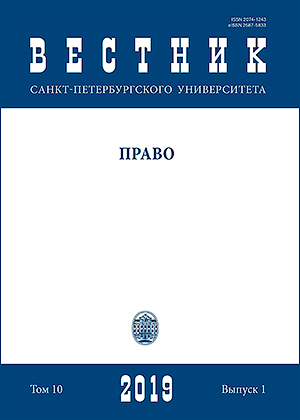Protection of interests of minors in the digital economy in the Russian Federation and the Republic of Kazakhstan
DOI:
https://doi.org/10.21638/spbu14.2019.111Abstract
The article analyzes the impact of processes of building the digital economy in the Russian Federation and Republic of Kazakhstan on the state of the information security of minors. Our states are encouraged to jointly urgently overcome the basic legal restrictions of the digital economy and regulate the use of innovative technologies. It is necessary to prevent the emergence of new threats to the information security of the individual. Special attention should be paid to the protection of information rights of minors. Among the main risks associated with the construction of digital economy in our republics are: the problems of potential violations in the authentication of the individual, low Internet literacy of minors, information vacuum – when there is no clear idea of the digital economy, ambiguous assessment of the child's capabilities in the digital economy, loss of purpose in life. The authors note that the transfer of the economy into digital form which is hasty, ill-conceived, and, most importantly, not regulated by law can harm the information security of minors. These problems should be the subject of the most rigorous scientific analysis in order to create special research and institutional structures. These structures should ensure the development of a new methodological and conceptual framework; the formation of an institutional mechanism: the development of legal, organizational, technical measures aimed at building a digital economy safe for the individual. In addition, it is necessary to monitor the development of all segments of the digital economy in order to identify emerging information threats.According to the authors, Russia and Kazakhstan need to follow the path of creating legislation that prevents the occurrence of problems and risks and which can also minimize their consequences. A number of provisions can be borrowed from the European experience.
Keywords:
digital economy, minors, information security, risks, legal regulation, Russia, Kazakhstan
Downloads
References
Downloads
Published
How to Cite
Issue
Section
License
Articles of "Vestnik of Saint Petersburg University. Law" are open access distributed under the terms of the License Agreement with Saint Petersburg State University, which permits to the authors unrestricted distribution and self-archiving free of charge.






